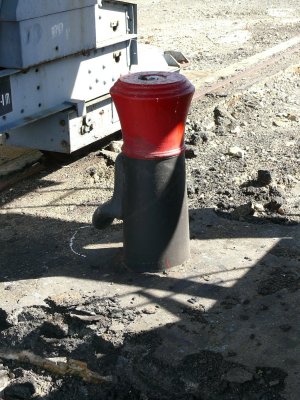
ARTILLERY REGISTER |
|||||||||||||||||||||||
|
|
||||||||||||||||||||||
| Historical Specifics: | SBML 12 Pounder guns had been used since the early 1700s. They came in several models that varied in length and weight. They were based on Armstrong’s construction until the late 1780s when Blomefields design was introduced. With the development of heavier calibre guns in the 1830’s and 40’s the usefulness of the 12 pounders was limited. SBML 12 Pounder guns are first recorded in NSW in 1800 with eight emplaced at Dawes Battery. By 1806 12 were emplaced at Dawes Battery and four at Georges Head. It is highly probable the bollards at Fitzroy Dock are the guns originally placed at Dawes Battery.
Construction of a dry dock at Cockatoo Island commenced in 1847 under the supervision of Gother Kerr Mann who was appointed Civil Engineer in charge. Delays occurred due to lack of funding and it was not until late 1857 that the first vessel entered the dry dock. Using convict labour, the dock had been excavated to a depth of 52 feet below the land surface. It was initially 316 feet in length and 76 feet in breadth, with an entrance 60 feet wide. 15 cannon barrels were dug into the sandstone as bollards. The dry dock was named after the Governor, Fitzroy Dock. In the mid 1970s one of the barrels was lifted from its position at the dock, restored and placed on a replica carriage and placed on display at the entrance to the Island. It was unveiled by The Rt Hon Lord Robens of Woldingham, Chairman of Vickers Limited, London. The gun a SBML 12 pounder remains on display to this day. Its position in the dock was replaced by a replica bollard. With the closure of the Cockatoo island in the late 1980s further barrels were recovered. Two were found to be broken, another with the trunnions missing (now at the Australian War Memorial) and two transferred to the National Artillery Museum. Ten barrels, including the replica, remain in position around the dock. |
||||||||||||||||||||||
| General Information on Gun Type: | |||||||||||||||||||||||
| Additional Photos: | |||||||||||||||||||||||
©
